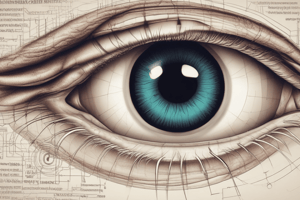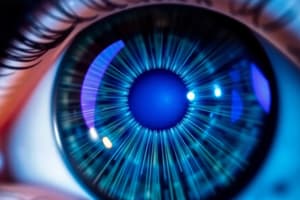Podcast
Questions and Answers
What is the role of the pupil in the eye?
What is the role of the pupil in the eye?
- To send signals to the brain.
- To control the amount of light entering the eye. (correct)
- To absorb light and produce chemical reactions.
- To form a real image on the retina.
Which part of the eye focuses light onto the retina?
Which part of the eye focuses light onto the retina?
- Photoreceptors
- Cornea and Lens (correct)
- Iris
- Optic Nerve
What type of image does the retina form?
What type of image does the retina form?
- A moving image
- A colored image
- A real, inverted, and smaller image (correct)
- A flat and larger image
What effect does the brain have on the image formed on the retina?
What effect does the brain have on the image formed on the retina?
How do digital cameras and the human eye primarily differ in forming images?
How do digital cameras and the human eye primarily differ in forming images?
What is the function of photoreceptors in the eye?
What is the function of photoreceptors in the eye?
What component of the eye is responsible for controlling the size of the pupil?
What component of the eye is responsible for controlling the size of the pupil?
Which statement about the image formed by both the eye and a simple camera is accurate?
Which statement about the image formed by both the eye and a simple camera is accurate?
Flashcards
What is the pupil?
What is the pupil?
The hole in the eye that allows light to pass through to the lens.
What does the iris do?
What does the iris do?
The part of the eye that controls the amount of light entering by expanding and contracting.
What are photoreceptors?
What are photoreceptors?
The light sensitive cells in the retina that convert light into electrical signals, enabling vision.
What is the cornea?
What is the cornea?
Signup and view all the flashcards
What is the lens of the eye?
What is the lens of the eye?
Signup and view all the flashcards
What is focusing?
What is focusing?
Signup and view all the flashcards
What is reflected light?
What is reflected light?
Signup and view all the flashcards
How is the image processed in the brain?
How is the image processed in the brain?
Signup and view all the flashcards
Study Notes
The Eye and the Camera
- The eye and digital cameras, such as pinhole cameras, both create images.
- Light reflects off an object.
- The cornea focuses the light
- The pupil controls the amount of light entering the eye.
- The lens further focuses light onto the retina.
- The image produced on the retina is real, inverted, and smaller than the object.
- Photoreceptors (rods and cones) in the retina absorb light to cause a chemical reaction which produces an electrical signal sent via the optic nerve to the brain.
- The brain interprets the inverted image correctly.
- Digital cameras have a grid of photosensitive pixels (CCD) that create an electrical charge when light hits them.
- The inverted image on the camera's sensor is then flipped to be viewed correctly.
- The eye and camera both create a reversed/inverted image.
- The eye and digital cameras are able to relay the image to the brain in a similar way.
Studying That Suits You
Use AI to generate personalized quizzes and flashcards to suit your learning preferences.




